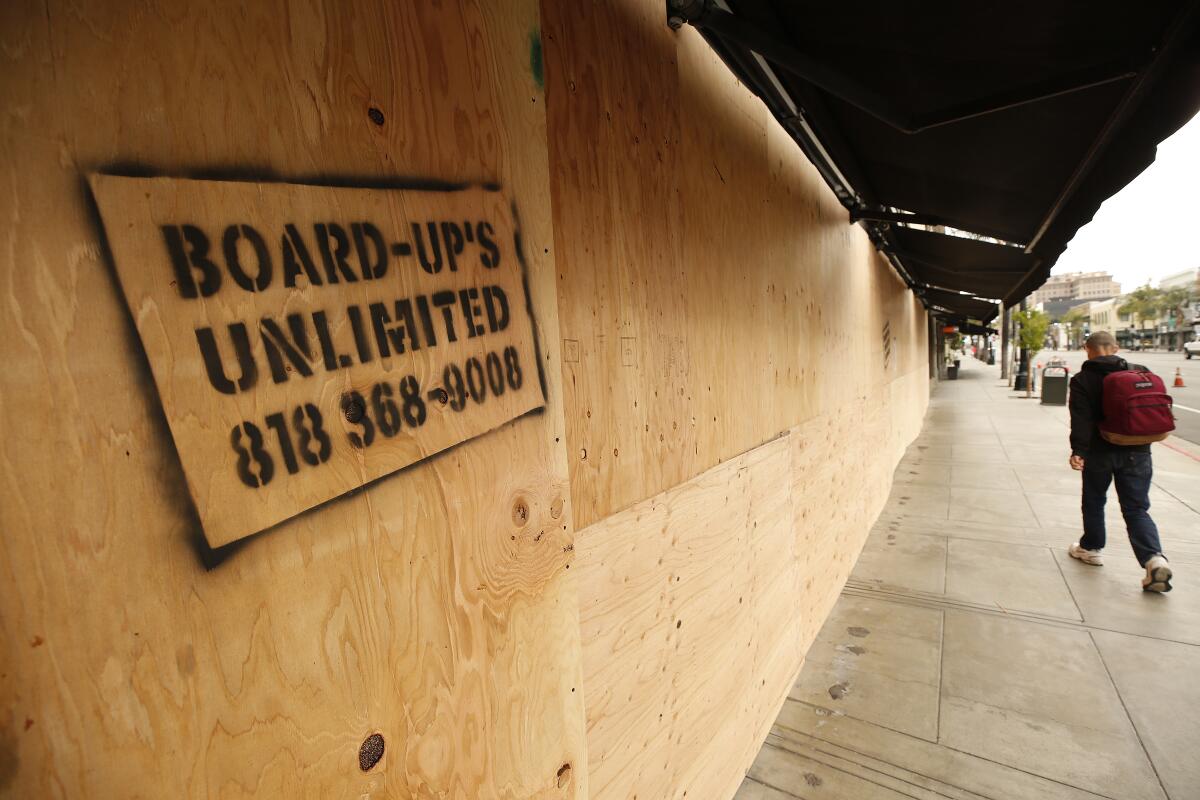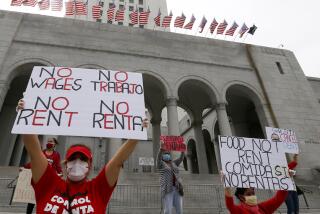U.S. small-business rescue exhausts cash with many still waiting

- Share via
The U.S. Small Business Administration said it has stopped accepting applications for a $349-billion federal relief program meant to help small businesses survive the coronavirus outbreak after funding ran out with many still waiting to get a lifeline.
The government-backed loans are available on a first-come, first-served basis, and there’s no remaining funding for the SBA to guarantee additional loans, officials said. Without more money for the program, many small firms that have flooded banks with applications won’t get help.
“The SBA is currently unable to accept new applications for the Paycheck Protection Program based on available appropriations funding,” the agency said in a statement on its website. “Similarly, we are unable to enroll new PPP lenders at this time.”
As of early Thursday morning, the SBA reported there had been more than 1.6 million applications approved for about $338 billion. Loan approvals have to stop when the total reaches about $339 billion because about $10 billion is needed to cover fees and processing, Republican Senator Marco Rubio of Florida said in a tweet.
The $339 billion is the value of loans the agency has approved for lenders to disburse, not money that has reached borrowers. The program, which launched April 3, ran out of funding after just two weeks.
A $349-billion federal relief program for U.S. small businesses is expected to run out of money Wednesday afternoon, with many still waiting for a lifeline.
Comprehensive data on how much money has actually been handed out to borrowers isn’t available, but lenders report that disbursements are being made.
U.S. Treasury Secretary Steven Mnuchin and SBA Administrator Jovita Carranza called on Congress to approve more money for the program, saying in a joint statement on Wednesday that it’s “saving millions of jobs” and helping small firms survive the pandemic.
“The high demand we have seen underscores the need for hardworking Americans to have access to relief as soon as possible,” they said. “We want every eligible small business to participate and get the resources they need.”
Republicans sought to approve an additional $250 billion for the program last week, but the effort stalled with Democrats also wanting changes to the program and more aid for other groups. Senate Democratic leader Chuck Schumer and Mnuchin talked Wednesday as negotiations continued.
Confusion and frustration bedevil attempts to keep employees on the job while getting a Payroll Protection Program loan.
In a joint statement on Wednesday, Senate Majority Leader Mitch McConnell and House Republican Leader Kevin McCarthy accused Democrats of blocking emergency aid and treating a bipartisan program “like a Republican priority which they need to be goaded” into backing.
“The cost of continued Democratic obstruction will be pink slips and shuttered businesses,” they said. “We hope Democrats see reason soon and finally heed Republicans’ repeated calls for a funding bill that can quickly earn unanimous consent.”
House Speaker Nancy Pelosi said Democrats are pushing for changes that will allow help for small businesses that have been shut out of the program because they don’t have access to a lender, as well as provide more funding for “desperate” state and local governments and hospitals.
“Democrats know that in order for the Paycheck Protection Program to succeed, it must work for everyone,” Pelosi said in a statement Wednesday. “That is why we have been asking for the Administration to work with us to help.”
The program, which was enacted last month as part of a $2.2-trillion relief package in response to the outbreak, offers loans of as much as $10 million. The loans convert to grants if proceeds are used to keep workers on the payroll and cover rent and other approved expenses for about two months, a short-term stopgap designed to help businesses get by until the economy reopens.
The initiative got off to a rocky start after Trump administration officials said that small businesses would get funding quickly, even the same day they applied. But some borrowers couldn’t find banks to take their applications if they didn’t already have a lending relationship, and lenders couldn’t process loans because of vague guidance and a clunky SBA computer system that has been inaccessible for periods of time.
Of the more than 1 million applications that SBA had processed as of Monday, construction firms had a larger share of loans approved than other industries so far, followed by professional, scientific and technical service companies, manufacturers and healthcare and social assistance firms. The average loan amount for all applications approved was $239,152, an SBA report shows.
More to Read
Inside the business of entertainment
The Wide Shot brings you news, analysis and insights on everything from streaming wars to production — and what it all means for the future.
You may occasionally receive promotional content from the Los Angeles Times.












